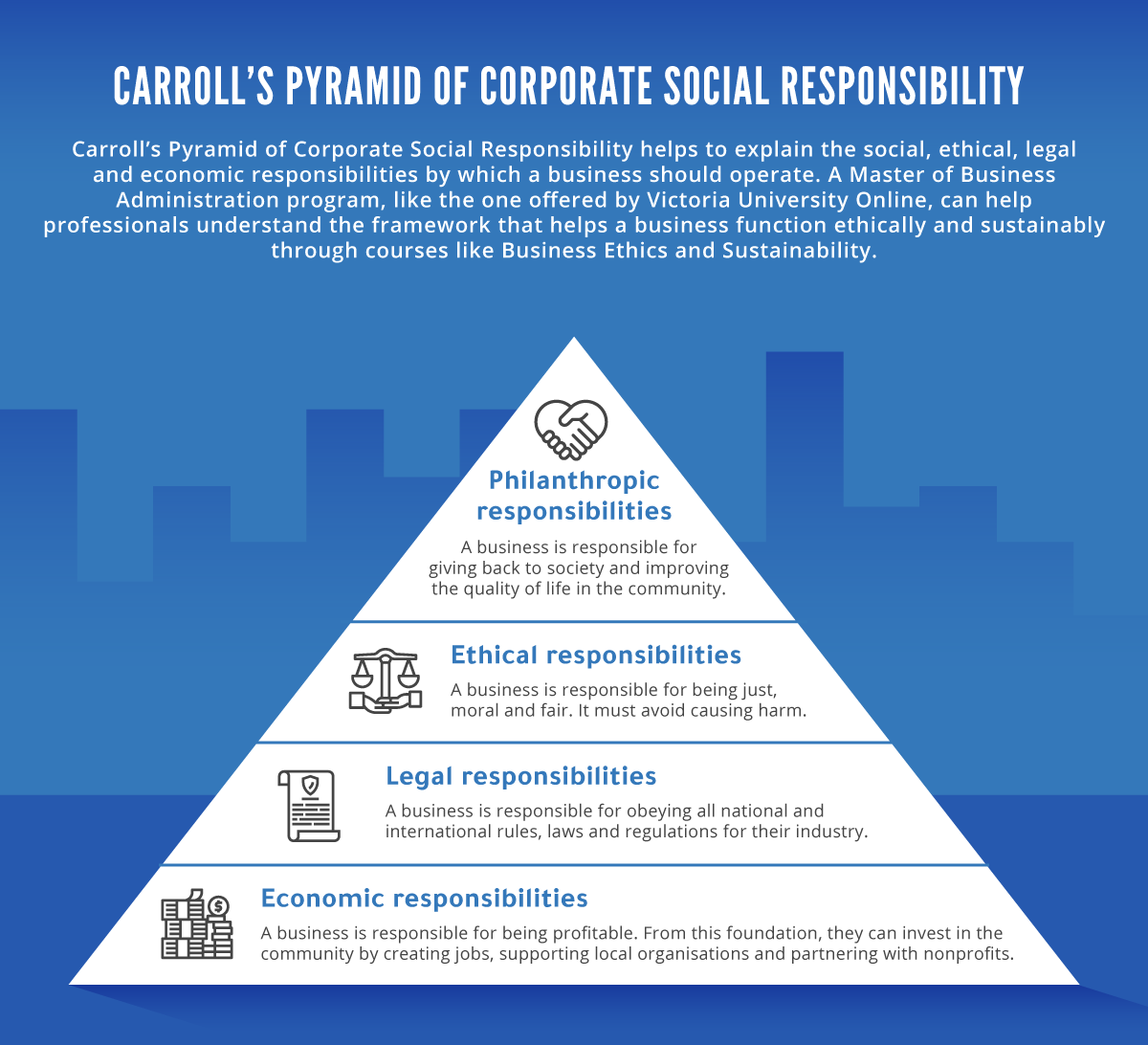
What is corporate social responsibility and its importance?
In today’s world, businesses are expected to be accountable for how their practices impact society and the environment. Corporate social responsibility (CSR) is no longer just a respected business practice, but a consumer-driven demand. That means it’s becoming increasingly important to understand what corporate social responsibility is and how it influences business practices.
CSR represents the business model and degree of responsibility companies should maintain to have a positive impact on the world. The CSR model outlines how a company can be accountable to itself, its staff, its stakeholders, the public and the environment.
In the past, CSR was something that was a nice-to-have for companies. Increasingly, though, it has become an expectation. Research suggests that 81 per cent of Australian consumers believe that demonstrating a commitment to sustainability adds value to a brand, and many will only buy from a company that has invested in CSR.
Understanding the appropriate ways to implement a CSR model has become vital for wanting to succeed in, or become a business leader in, a modern business. Gaining qualifications to do so is also becoming more important.
Defining corporate social responsibility
While it may be common, defining what corporate social responsibility is and implementing it is not as simple as it may seem. Most businesses exist to deliver a profit, either to their owners or to their respective shareholders. CSR positively challenges this model.
Companies are said to display CSR if they recognise that they have a responsibility to give back to the environment and put programs in place to ensure that they are giving back to society beyond simply making a profit. The idea behind CSR is that businesses need to take a broader view of what success looks like, instead of simply measuring and reporting on their finances.
Carroll’s pyramid of corporate social responsibility
Corporate social responsibility is not a new concept. The earliest forms of CSR surfaced when American economist Howard Bowen coined the term in his book Social Responsibilities of the Businessman in 1953. He described CSR as the obligation of businesses to pursue policies that are ‘desirable in terms of the objectives and values of our society’.
In 1991, Archie Carroll organised the expected corporate social responsibilities into a four-level model called the ‘pyramid of corporate social responsibilities’. The commonly used framework consists of four different responsibilities: economic, legal, ethical and philanthropic.
Economic responsibilities
The first level of the pyramid is economic responsibilities, and it states that the first priority should be creating profit through economic growth. A business cannot survive otherwise.
Legal responsibilities
The second level of the pyramid defines a company’s responsibility to follow all laws, regulations and compliances as they apply to the business operations. An organisation must adhere to the rules laid out by society if it wishes to function as a business.
Ethical responsibilities
The third level of the pyramid lays out the ethical responsibilities of a business. Management determines ethical responsibilities, which include making moral decisions that impact employees, customers, the supply chain and the environment.
Philanthropic responsibilities
The fourth level of the pyramid refers to the expectation that a business will contribute to the quality of life for society. To be a good corporate citizen, a company should take part in initiatives such as volunteering or fundraising to give back to society.
Why is corporate social responsibility important?
CSR is more than simply ‘the right thing to do’. It can also represent a major competitive advantage for a company for the following reasons:
Improved brand perception
CSR can have a positive impact on the perception of an organisation’s brand, as well as the organisation’s overall reputation.
Boosted morale for employees
CSR practices help boost employee morale as employees and employers gain a greater sense of purpose in their work. In recent times, employees are starting to value the sense of purpose in their work, as well as the idea that their company gives back. Research suggests that companies that invest in their CSR offering are far more likely to attract and retain employees, and their employees are also more likely to be productive at work.
Improved customer loyalty
Customers value CSR and companies that invest in it will likely have higher customer retention and loyalty.
Greater competitive advantage
Companies that are socially responsible are more likely to obtain a competitive advantage in the marketplace due to superior brand recognition and the ability to attract and retain the best staff.
In the last few years, CSR has become more important as consumers have started to recognise how businesses can have a big impact on the environment and social issues. In a world where consumers can easily voice public outrage against businesses via social media and peer-to-peer platforms, maintaining CSR has become critical to a brand’s success.
Corporate social responsibility trends
When it comes to understanding what corporate social responsibility is and implementing it, many organisations are currently following numerous trends. Here are a few different ways that companies are using and implementing CSR.
Environmental, social and governance criteria
Businesses are expected to measure and report against different criteria. The existence of environmental, social and governance (ESG) criteria means that organisations have a baseline for what they are doing and can measure progress. Criteria can also be used to compare companies, helping customers understand how impactful a company’s CSR efforts really are.
Business managers and investors use ESG criteria when evaluating corporate behaviour. Socially conscious investors decide to invest after assessing a company’s operations and behaviour as it relates to the criteria. Consumers and employees favour companies that seek to prioritise values like inclusion, empathy and environmental preservation.
Environmental criteria include how a company attempts to reduce its ecological footprint and not cause harm to the environment. Social criteria have to do with whether a company manages employees, customers, suppliers and the community in a fair and inclusive way. Governance refers to how a company deals with its leadership, pay, audits and shareholder rights.
Diversity and inclusion programs
With the gender pay gap still at 22 per cent in Australia, admittedly the nation has a long way to go when it comes to diversity and inclusion (D&I). For this reason, D&I metrics are often reported on as CSR initiatives.
D&I initiatives encapsulate programs and policies that encourage increased representation of diverse groups of people. These groups can include people of varied cultural backgrounds, religions, ages, genders, sexual orientations, abilities and disabilities.
Diversity can also include varying work experiences, styles of thinking and personality types. D&I is an increasing priority with multiple benefits in an organisation’s business strategy.
Ethical supply chain and packaging
Unfortunately, only 16 per cent of Australia’s packaging gets recycled or reused. For this reason, businesses are expected to seek opportunities to improve the supply chain and packaging by producing products both ethically and sustainably. A corporation’s supply chain impacts suppliers, logistics providers and consumers.
Purpose-led branding
Given the importance of CSR to consumers, customers want brands to be loud and proud of their CSR efforts.
A purpose-led brand can create an empathetic and emotional connection with consumers and offer more than just the product or service it sells. A business that chooses to feature its purpose in its brand identity can expect to not only make a difference in the world but also influence purchasing behaviour.
Corporate social responsibility examples: The good
Many companies today are becoming increasingly aware of what corporate social responsibility is and the associated benefits that go beyond their bottom line. Generally, the more socially responsible and conscious a company is, the more the public supports that organisation.
Examples of CSR in action are as follows:
- Reducing the carbon footprint
- Engaging in charity work
- Purchasing fair trade products
- Investing in environmentally conscious businesses
- Getting involved in volunteer work
- Improving labour policies
Here are examples of positive CSR initiatives in action.
Johnson & Johnson
Multinational big pharma company Johnson & Johnson has continuously prioritised CSR. For the past several decades, Johnson & Johnson has focused on reducing its environmental impact and advocating for clean energy use. In 2016, it agreed to buy half of the output of a privately owned, 200-megawatt wind project in Texas to cut down on nonrenewable energy use and pollution.
More recently, Johnson & Johnson put forth its Health for Humanity 2025 Goals, which have specific milestones that focus on workplace empowerment, health equity, sustainability, accountability and innovation.
The company’s ESG strategy features three guiding principles:
Champion global health equity. Improve global healthcare affordability and access to foster better health for all.
Empower our employees. Advocate for a healthy and supportive workforce that represents those they serve.
Advance environmental health. Support environmental health and business resilience.
The Walt Disney Company
Walt Disney always believed that ‘anything that has a Disney name to it is something we feel responsible for’. Acting responsibly has been a key priority for the company, and it continuously seeks innovative alternatives to reduce its environmental impact.
In 2009, The Walt Disney Company began striving to reach its environmental targets. It has a comprehensive CSR strategy that includes five important pillars: emissions, water, waste, materials and sustainable design.
With a long-term goal to reach a ‘zero’ state of net greenhouse gas emissions and waste, the company has committed to reducing absolute emissions (Scopes 1 and 2, from its direct operations) by 46 per cent by 2030.
The company’s other CSR projects include the following:
Reducing its environmental impact by running resort trains on biodiesel made from recycled cooking oil from restaurants and hotels
Increasing the populations of at-risk wildlife through conservation projects that help animals, including apes, butterflies, monkeys, rhinos, sea turtles, sharks and tigers
Awarding grants to nonprofit organisations for their environmental conservation efforts through the Disney Conservation Fund

Woolworths
In 2019, Woolworths announced that it would separate from its investment in the pokies business, one which, according to Proudly Pokies Free, is costing Australians billions of dollars every year. The pokies machines have been specifically designed to induce addictive tendencies, with more than 300,000 Australians addicted to the machines.
Woolworths’ investment in gambling and pokies machines had been beneficial for its wallet, but risky for its reputation. As protests and social media callouts on the issue increased, the major chain decided to opt out.
By listening to the increasing demands of the public, Woolworths has chosen to make a positive impact on society. The decision will be costly to its net income, but it shows a commitment to its social values, a trait that is expected and admired in the world today.
Other CSR initiatives by leaders in Australia include the following:
- Sony – aiming to achieve a zero environmental footprint by 2050
- Westpac – providing Community Resilience and Natural Disaster Recovery grants
- PwC – committing to investing in the future growth of 15 million people and non-governmental organisations (NGOs) through social enterprises and micro enterprises
Why corporate social responsibility initiatives fail
In a time when social impact is demanded, many companies are shifting their strategies to incorporate activities for the greater good. However, this does not necessarily mean that they are doing it well.
As people become advocates for a company, they increasingly expect transparency and authenticity from a business that declares to do good. The reasons that CSR initiatives fail to include the following:
- Companies choose to promote ‘socially responsible’ behaviour with insufficient evidence to support it.
- There is no attempt at getting stakeholder, customer or employee buy-in on the CSR strategy.
- There is no measurement of the CSR strategy value.
- The advocacy campaign does not align with a brand’s operations, services or message.
Many businesses are becoming aware of what corporate social responsibility is and how it may help change perceptions and reputations. However, what some businesses say to the public can be misleading.
Here are some examples of misleading or disingenuous CSR.
greenwashing
Swedish fast-fashion chain has been called out recently for continuing to deceive consumers when it comes to its sustainability initiatives. This is known as greenwashing: the act of giving a false impression that a company and its products are more environmentally friendly than they truly are.
The internationally renowned fashion company has marked some of its products as ethical and environmentally friendly, yet it still produces materials at a rate that is not environmentally friendly. As a result, has received criticism in the media.
Virgin Australia’s ‘tokenistic’ campaign
Virgin Australia found itself in hot water for an attempt at CSR when it announced a plan to give Australian veterans a public acknowledgement on flights and priority when boarding. Unfortunately, the company failed to consult the veterans first.
The move was considered ‘tokenistic’ by many, with the company accused of causing discomfort to veterans. The airline was called out for seeking an opportunistic moment on Remembrance Day and failing to engage with the community first. Virgin Australia’s attempt to participate in CSR backfired, showing the importance of considering a strategy driven by engagement, rather than opportunism.
Unilever’s superficial CSR policies
Since CEO Paul Polman began leading Unilever, a giant multinational corporation selling consumer goods across the globe, he has regularly highlighted his eagerness to combat climate change and address social issues. However, the company has faced ridicule in recent years.
Unilever made headlines when nearly 600 workers in India suffered life-threatening mercury exposure. It made headlines again when a newspaper exposed claims of sexual harassment, stating that African workers were forced to bribe their supervisors to prevent unwanted advances. These controversies had a damaging impact on the company, causing its growth to slow and its reputation to decline.
Key elements of successful corporate social responsibility
While the goal of corporate social responsibility is to push businesses to act responsibly and ethically toward the environment and community, some disadvantages exist. Engaging in CSR is not always cheap. It can rely on expensive structures and strategies to plan, execute and measure.
A poorly planned CSR strategy that does not deliver what it says can quickly become a failure and a business liability. The impact on a business’s reputation can be detrimental, and the community will quickly scrutinise its actions. Here are some elements of successful CSR.
Transparency
Exaggerating or hiding business practices can cause distrust in a business. Companies should make their socially responsible motives clear.
Measurements
If a company chooses to engage in CSR, the impact should be assessed. Examples of assessing impact could be measuring key indicators over time, such as calculating emissions or volunteer hours. Listening to stakeholders’ and customers’ opinions will determine impact as well.
Accountability
When engaging in CSR, businesses should be accountable to their employees, stakeholders and customers. While government bodies do not regulate CSR, being responsible for its actions is vital for a successful CSR strategy.
Consistency and dedication to excellence
Responsible companies will ensure that a CSR strategy is consistent. Truly responsible businesses will not only utilise social responsibility as a publicity stunt but also actively prioritise sustainability and environmentally conscious actions that benefit their employees, stakeholders and customers.
Corporate social responsibility in the future
Today, people do not just expect companies to be socially responsible, ethical, transparent and inclusive – they demand it. By pursuing a Master of Business Administration (MBA), you can develop valuable business skills and discover how to create strategies to address social and environmental issues through ethically responsible business management.
There are numerous advantages to studying CSR in an MBA program. In fact, more and more customers and shareholders choose to support and purchase from companies that make a positive impact on society and the environment. Employees also perform better when they feel they are supported and included in a business culture that promotes diversity and purpose-led work. From improved employee engagement and customer loyalty to increased sales and environmental impact, CSR is a vital endeavour for any company.
When it comes to CSR, an MBA can make a difference. Victoria University Online’s MBA can equip you with the skills you need to lead CSR initiatives that position your business to make a positive difference in the world.




